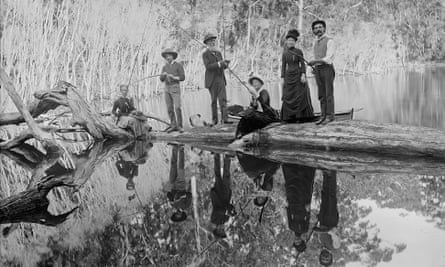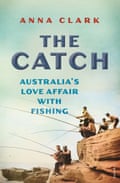When I was little, I spent summer evenings playing on the sand and exploring little rock pools while my dad fished. The sun would set, and I’d wait into the dark, knowing that he’d soon be walking back across the rocks, triumphant, with a lop-sided smile and a tailor or two for dinner.
As I got older, fishing became my refuge. One of my brothers lives with a profound intellectual disability. At home, in the city, he screamed, broke plates on the front steps and tried to throw my cat off the balcony.
At my grandparents’ farm by the coast, where we stayed in a little stone shack, his unpredictability wasn’t so extreme, or public. And all that space meant I could also retreat into a quiet, private place away from constant, volatile movement and unease.
Fishing gave me solitude and freedom. I perched on rocks in isolated bays where I watched water foam below me and crabs scuttle along the crevices in between the waves. I was washed through channels with long leathery kelp that wrapped around my skinny legs while I searched for abalone, and I startled stingrays that shot out from under my feet when I fished for flathead and bream.
I have my own kids now, and memories rush through me when I see them replaying my own childhood. Over long summers they cast fishing lines baited with cunjevoi, snorkel for mussels, and spy octopus with the same sense of delight and wonder.
Those rocky headlands and beaches of the far south coast of New South Wales feel like my own personal archive, but they’re not, of course. All around are signs of a much longer, deeper time of fishing. I’m kidding myself if I think its history is mine alone.
Middens at the top of a track signal a human presence at this place extending back thousands of years. Shells scattered through the sandy soil are the tailings of countless family meals at this very spot. How many people have sat here cooking a feed, looking for the telltale silver flash of fish in the waves, or waiting to drag their sodden kids out of the water?

Oral histories, environmental records and archaeological sources populate this Country’s deep human history with the practices and culture of people who lived it. Local histories reveal multigenerational connections between Yuin people and killer whales. Detailed accounts by Aboriginal women recount abalone harvesting in the clear, cold waters off the beach.
There are constant reminders of First Nations occupation and knowledge. Sacred sites are dotted through the landscape and in community memories. Aboriginal tools and artefacts sometimes appear in the soil when you’re digging a post hole. The regular spacing of elderly kurrajong (fishing line) trees along a track down to the beach hint at complex systems of land management and cosmology.
An Aboriginal native title claim for sea rights makes my family’s 50-year presence seem about as historically significant as a grain of sand.
All over the country, from Murujuga in Western Australia to Cape York in the north, vast galleries document how fishing’s wonder and delight have been enshrined and shared for thousands of generations.
Europeans’ first encounters with fishing in Australia were similarly enchanting, and they relayed stories of incredible fishing bounties and ‘new’ species that quickly became staples for recreational fishers in the growing colonies.

Keen anglers in the 19th century ducked down to the local wharf or harbour cove after work for a quiet fish or stashed a blanket and a pan in the coastal scrub, anticipating the next weekend or favourable moon.
Although that abundance turned out to be more precarious than first impressions. After decades of unregulated fishing near the growing colonial cities, fishers also fought for legislation, agitating to protect key waterways.
That love affair with fishing endures. In every coastal town, there’s a bait shop and a boat ramp. In garages around the country, fishing rods are strung up waiting for the next holiday, or weekend, or tide. Fishing guides sell by the thousand.
For those who fish, it’s not simply the thrill of the catch or desire to hunt that sees billions of dollars spent on tackle and tourism, or countless hours poring over Google Maps trying to find a promising spot. It’s those moments of (and in) time that weld fishers to the natural world, watching a tide turn, a wind change, or a sun set.
That’s because “fishing largely consists of not catching fish”, as the art historian (and avid fisho) Robert Hughes once mused. “To fish at all, even at a humble level, you must notice things: the movement of the water and its patterns, the rocks, the seaweed, the quiver of tiny scattering fish that betrays a bigger predator under them.”
Although, that immeasurable quality of fishing is complicated by growing environmental pressures that are all too quantifiable. Industrial development, climate change, water management and overfishing have all impacted our recreational fisheries.
In 2022, sand flathead populations were feared to be on the verge of collapse in Tasmania after generations of being a favoured recreational catch. In 2019, the South Australian state government announced a total snapper closure for recreational and commercial fishers in several fishing zones until at least 2026. And the latest information about mulloway stocks in NSW reveals they’re now well under 20% of virgin biomass (and that figure is possibly as low as 10%).

It’s estimated that about 4.2 million Australians fish recreationally, and the recreational fishing industry accounts for around $11bn a year. It’s one of the nation’s most popular pastimes. Yet it’s popularity also raises critical questions about fisheries management.
While those weekend catches of bream or squid by families like mine right around the country are impossible to aggregate accurately, they all add up.
Australians’ love of fishing constitutes a bit of a paradox. Measurement and management are at the heart of recreational fishing’s sustainability into the future.
But the joy of being outdoors, of fishing by ourselves or with our families can’t be measured. And that’s part of its enduring allure.
-
Anna Clark is a professor of history at the University of Technology Sydney. Her book The Catch is out now through Penguin Random House
"fish" - Google News
September 03, 2023 at 08:21AM
https://ift.tt/4NQF1y6
Wonder, delight and deep human history: the persistence and paradox of Australia’s love of fishing - The Guardian
"fish" - Google News
https://ift.tt/vBKYt3N
https://ift.tt/jRXbPH1
Bagikan Berita Ini














0 Response to "Wonder, delight and deep human history: the persistence and paradox of Australia’s love of fishing - The Guardian"
Post a Comment